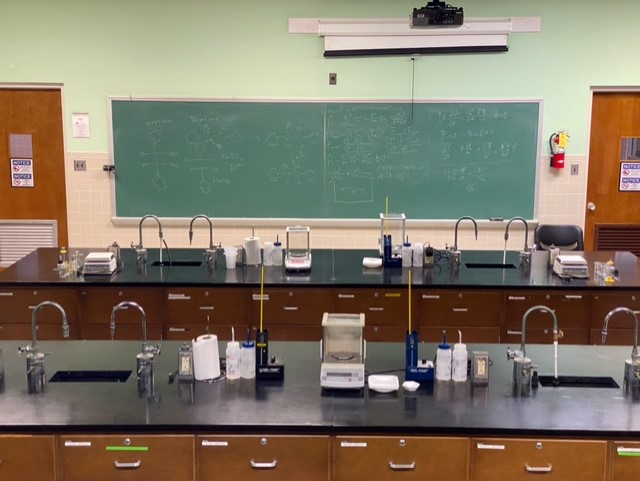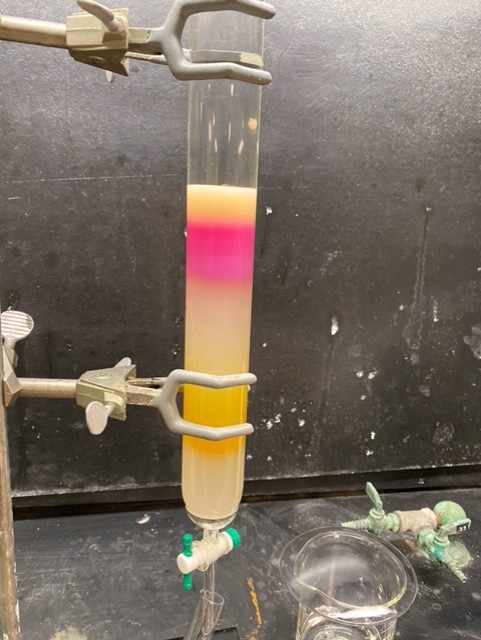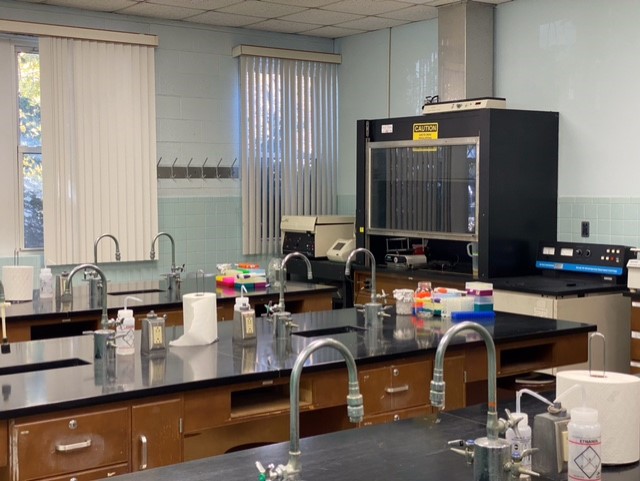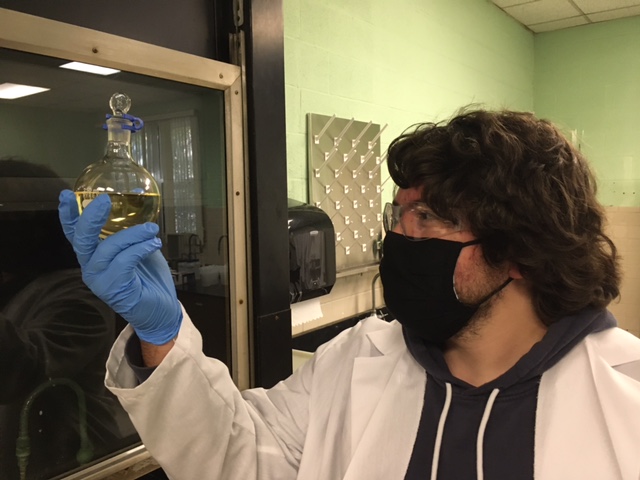
By: Kyle Garrett, Regular Content Creator
Photos from Kyle Garrett
In the pursuit of academics, well-rewarded are those that go above and beyond the call of duty. This week we will peek into the work being done by students who have chosen to pursue guided undergraduate academic research in the natural sciences here at McKendree in Voigt Science Hall, as well as the opportunities that their advisors provide them.
In Chemistry, Associate Professor Dr. Vincent Dunlap has brought to McKendree several opportunities for guided research. As an educator, Dr. Dunlap states his philosophy towards education as such: “I want my students to come away from my class concerned citizens. I want them to understand that chemistry is not all about measuring and pouring. There are things we do in chemistry that have real-world, day-to-day impacts on our lives.”

Dr. Dunlap is a bio-organic chemist, who currently teaches Biochemistry and General & Organic Chemistry, as well as his own periodically-offered Medicinal Chemistry special topics course.
In academic research, Dr. Dunlap is currently pursuing several projects ranging from the development of new colored dyes to be used in the tracing of lymph channels to identify cancerous developments in patients suffering from breast cancer, as well as a development of a nucleoside-based set of compounds meant to introduce error in the replication processes of viruses. Both projects serve to address aspects that are medically relevant, growing problems that society faces, which have become magnified in the past year with the onset and continued struggle against chronic illnesses such as cancer and acute diseases that have long lasting effects, like COVID-19.
Senior student researcher Nigel Bennett, a double major in Chemistry and Mathematics, offers us insight into his work on his project covering antivirals.
“We are working to test several variations of a base compound meant to be taken into a virus’s DNA for their potential in antiviral use,” says Bennett. “In this context, think of DNA as a tower of Jenga blocks. In theory, if we can insert this compound into the virus’s DNA, it could decrease the stability of the DNA overall and cause it to fall apart, thus preventing the propagation of the virus.”
The aim of the project is meant to exploit the unique nature of viral replication in virions responsible for some of the world’s most troublesome conditions such as HIV, Hepatitis C and perhaps COVID-19.
These viruses reproduce by utilizing an error-prone enzyme that produces double stranded DNA from single stranded RNA, which goes on to be replicated by the host cells and are then used to produce new viruses. This process does not follow the traditional rules for DNA replication, and because of the enzyme’s high error output, the virus can mutate rapidly to avoid treatment.
In the process of conducting research, Bennett found the practical application of many concepts learned in his classes to be both exciting and challenging. Bennett captures the essence of these challenges.
“Many of the reactions are water sensitive,” he states. “This heavily impacts the methods we employ because we have to take steps to remove water from chemicals and to also prevent water from entering the system, even moisture naturally present in the environment, while a reaction is underway.”
Nigel hopes to have his work showcased in this year’s academic excellence day celebration for the campus community.

In the Department of Biology, Dr. Robb Van Putte provides opportunities for students to not only become competitive applicants to graduate schools and in the job market, but also to receive a valuable foundation for continuing academic pursuits in day-to-day life. Dr. Van Putte teaches a wide range of biology classes at McKendree, covering Biotechnology, Cell Biology, Genetics, Microbiology and Senior Theses in Biology.
Dr. Van Putte is currently working alongside Dr. Mike Louison to advise two senior pre-professional Biology majors: Riley Ross and Emma Knoebel. Ross and Knoebel are both working towards the completion of their honors theses. They became fascinated with the prospect of working with wildlife and doing some of the first work in this field studying different enzymes of fish in response to stress.
Since his arrival here at McKendree in 2017, Associate Professor of Biology Dr. Mike Louison continues to maintain a strong affinity both for academic research and providing opportunities for students to experience that research. Dr. Louison is an eco-physiologist who utilizes fish as a model system. Ecophysiology is the study of animals and how their bodies respond to their environments and the stressors present within them. While most of his research covers fish, the behavioral principles can be applied to most other animal groups as well.
Alongside the teaching of biology classes such as Evolution, Comparative Vertebrate Anatomy, Animal Behavior and Introduction to Biology, Dr. Louison strives to provide students interested in research with the opportunity to travel beyond southern Illinois. He offers an annual trip to the northern Great Lakes region for studies involving ice fishing.
Currently, Dr. Louison and Dr. Van Putte are assisting Ross and Knoebel with their work studying the enzyme activity of catfish following exposure to air. To gather data, Ross and Knoebel went to Baldwin Lake with Dr. Louison to catch catfish with rod and reel. The fish they caught were exposed to air for either one or five minutes, and then tested for their reflex responsiveness. If the fish had difficulties swimming quickly or in straight lines, then it could be concluded that the stress of being caught negatively affected their reflexes. The fish were then held in crates in the water for either 30 minutes or four hours. After this, they were reflex tested again, and had blood drawn to observe levels of glucose and lactate. Ross and Knoebel also collected plasma samples from the blood to examine for levels of two enzymes – lactate dehydrogenase and alkaline phosphatase. Higher levels of both enzymes indicate a high degree of cell death, which is obviously bad for the fish.

Following their testing on the catfish’s reflex responsiveness and the fish plasma samples, Ross and Knoebel came to a conclusion:
“The fish in our experiment had increased stress levels in response to being caught and exposed to air for certain amounts of time”, the team explained. “However, after being released back into the water for a certain amount of time, their stress levels typically return to a normal, healthy level. This could mean that fish are at risk for predation especially right after they are released. This provides a basis for possible further research to further expand on topics that our experiment did not specifically cover.”
Through their work here at McKendree, Ross and Knoebel have determined that catfish handle being caught rather well, and do not suffer long term effects from brief windows of air exposure during catch-and-release fishing. Dr. Louison hopes to have Ross and Knoebel present their findings, too.
If you have any interest in academic research in the sciences, reach out and express your interest to your professors. Pursuing research here at McKendree can lay the foundations for a lifetime of inquiry by providing an environment that is vibrant, challenging and fun, while also opening the doors to many career paths!
